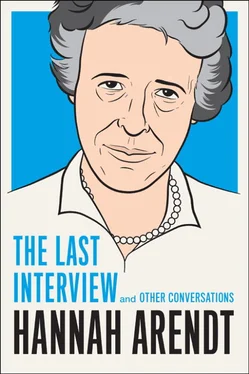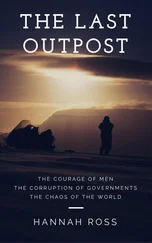GAUS:This was your reaction when you came in 1949?
ARENDT:More or less. And today, now that things are back on track, the distance I feel has become greater than it was before, when I experienced things in that highly emotional state.
GAUS:Because conditions here got back on track too quickly in your opinion?
ARENDT:Yes. And often on a track to which I do not assent. But I don’t feel responsible for that. I see it from the outside now. And that means that I am far less involved than I was at that time. That could be because of the lapse of time. Listen, fifteen years are not nothing!
GAUS:You have become much more indifferent?
ARENDT:Distant… “indifferent” is too strong. But there is distance.
GAUS:Miss Arendt, your book on the trial of Eichmann in Jerusalem was published this fall in the Federal Republic. Since its publication in America, your book has been very heatedly discussed. From the Jewish side, especially, objections have been raised which you say are partly based on misunderstandings and partly on an intentional political campaign. Above all, people were offended by the question you raised about the extent to which Jews are to blame for their passive acceptance of the German mass murders, or to what extent the collaboration of certain Jewish councils almost constitutes a kind of guilt of their own. In any case, for a portrait of Hannah Arendt, so to speak, a number of questions come out of this book. If I may begin with them: Is the criticism that your book is lacking in love for the Jewish people painful to you?
ARENDT:First of all, I must, in all friendliness, state that you yourself have become a victim of this campaign. Nowhere in my book did I reproach the Jewish people with nonresistance. Someone else did that in the Eichmann trial, namely, Mr. Haussner of the Israeli public prosecutor’s office. I called such questions directed to the witnesses in Jerusalem both foolish and cruel.
GAUS:I have read the book. I know that. But some of the criticisms made of you are based on the tone in which many passages are written.
ARENDT:Well, that is another matter. What can I say? Besides, I don’t want to say anything. If people think that one can only write about these things in a solemn tone of voice… Look, there are people who take it amiss—and I can understand that in a sense—that, for instance, I can still laugh. But I was really of the opinion that Eichmann was a buffoon. I’ll tell you this: I read the transcript of his police investigation, thirty-six hundred pages, read it, and read it very carefully, and I do not know how many times I laughed—laughed out loud! People took this reaction in a bad way. I cannot do anything about that. But I know one thing: three minutes before certain death, I probably still would laugh. And that, they say, is the tone of voice. That the tone of voice is predominantly ironic is completely true. The tone of voice in this case is really the person. When people reproach me with accusing the Jewish people, that is a malignant lie and propaganda and nothing else. The tone of voice, however, is an objection against me personally. And I cannot do anything about that.
GAUS:You are prepared to bear that?
ARENDT:Yes, willingly. What is one to do? I cannot say to people: You misunderstand me, and in truth this or that is going on in my heart. That’s ridiculous.
GAUS:In this connection I should like to go back to a personal statement of yours. You said: “I have never in my life ‘loved’ any people or collective group, neither the German people, the French, the Americans, nor the working class or anything of that sort. I indeed love only my friends, and the only kind of love I know of and believe in is the love of persons. Moreover, this ‘love of the Jews’ would appear to me, since I am myself Jewish, as something rather suspect.” [b] Arendt to Scholem, July 24, 1963.
May I ask something? As a politically active being, doesn’t man need commitment to a group, a commitment that can then to a certain extent be called love? Are you not afraid that your attitude could be politically sterile?
ARENDT:No. I would say it is the other attitude that is politically sterile. In the first place, belonging to a group is a natural condition. You belong to some sort of group when you are born, always. But to belong to a group in the way you mean, in a second sense, that is, to join or form an organized group, is something completely different. This kind of organization has to do with a relation to the world. People who become organized have in common what are ordinarily called interests. The directly personal relationship, where one can speak of love, exists of course foremost in real love, and it also exists in a certain sense in friendship. There a person is addressed directly, independent of his relation to the world. Thus, people of the most divergent organizations can still be personal friends. But if you confuse these things, if you bring love to the negotiating table, to put it bluntly, I find that fatal.
GAUS:You find it apolitical?
ARENDT:I find it apolitical. I find it worldless. And I really find it to be a great disaster. I admit that the Jewish people are a classic example of a worldless people maintaining themselves throughout thousands of years…
GAUS:“World” in the sense of your terminology as space for politics.
ARENDT:As space for politics.
GAUS:Thus the Jewish people were an apolitical people?
ARENDT:I shouldn’t say that exactly, for the communities were, of course, to a certain extent, also political. The Jewish religion is a national religion. But the concept of the political was valid only with great reservations. This worldlessness which the Jewish people suffered in being dispersed, and which—as with all people who are pariahs—generated a special warmth among those who belonged, changed when the state of Israel was founded.
GAUS:Did something get lost, then, something the loss of which you regret?
ARENDT:Yes, one pays dearly for freedom. The specifically Jewish humanity signified by their worldlessness was something very beautiful. You are too young to have ever experienced that. But it was something very beautiful, this standing outside of all social connections, the complete open-mindedness and absence of prejudice that I experienced, especially with my mother, who also exercised it in relation to the whole Jewish community. Of course, a great deal was lost with the passing of all that. One pays for liberation. I once said in my Lessing speech…
GAUS:Hamburg in 1959… [c] Arendt’s address on accepting the Lessing Prize of the Free City of Hamburg is reprinted as “On Humanity in Dark Times: Thoughts About Lessing,” in Men in Dark Times (New York: Harcourt, Brace & World, 1968).
ARENDT:Yes, there I said that “this humanity… has never yet survived the hour of liberation, of freedom, by so much as a minute.” You see, that has also happened to us.
GAUS:You wouldn’t like to undo it?
ARENDT:No. I know that one has to pay a price for freedom. But I cannot say that I like to pay it.
GAUS:Miss Arendt, do you feel that it is your duty to publish what you learn through political-philosophical speculation or sociological analysis? Or are there reasons to be silent about something you know?
ARENDT:Yes, that is a very difficult problem. It is at bottom the sole question that interested me in the whole controversy over the Eichmann book. But it is a question that never arose unless I broached it. It is the only serious question—everything else is pure propaganda soup. So, fiat veritas, et pereat mundus [let truth be told though the world may perish]? [d] Arendt plays with the old Latin adage Fiat iustitia, et periat mundus (Let justice be done, though the world may perish). See also Between Past and Future (New York: Viking Press, 1968), 228.
But the Eichmann book did not de facto touch upon such things. The book really does not jeopardize anybody’s legitimate interests. It was only thought to do so.
Читать дальше












